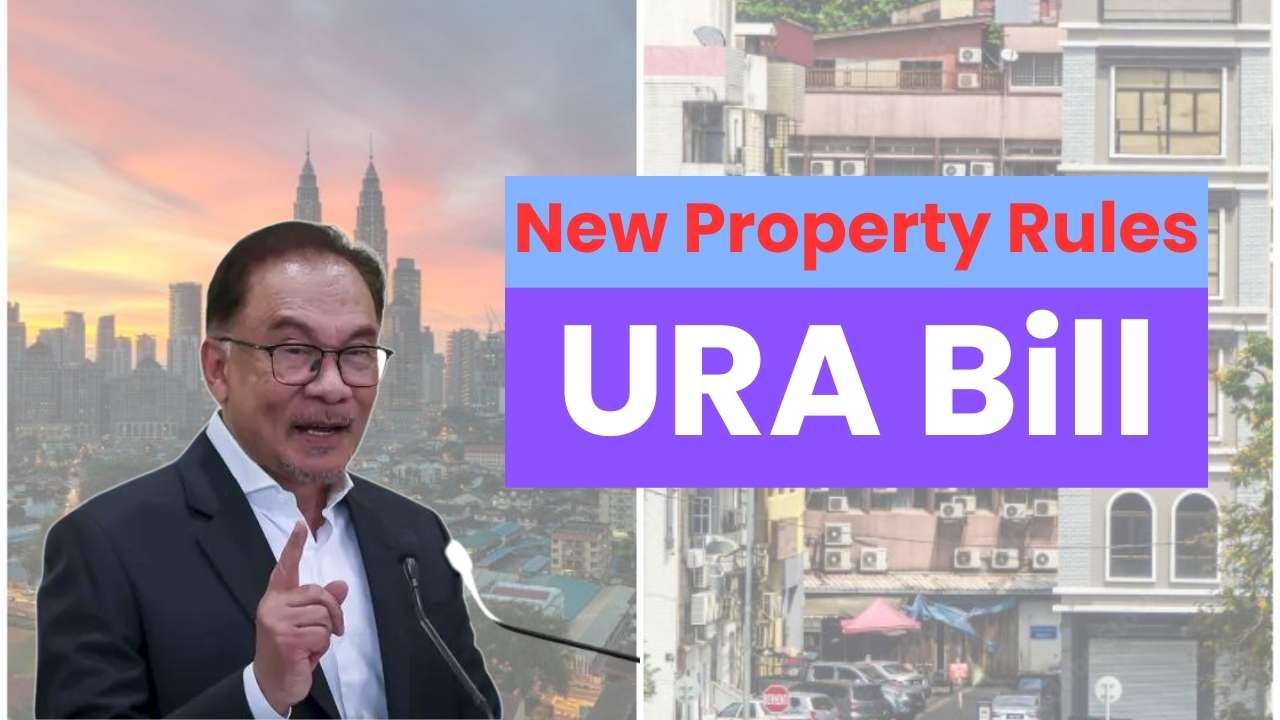On August 21, 2025, Malaysia’s Parliament introduces the long-awaited Urban Renewal Authority (URA) Bill, a proposal that could reshape city skylines. But as billions in redevelopment value hang in the balance, homeowners fear their rights may sacrifice.
With consent thresholds slashed to 80%, 75%, and even 51%, the URA Bill promises faster urban renewal across Malaysia. Yet behind the numbers, critics warn of forced evictions, constitutional clashes, and uncertain futures for thousands of families. Check out all about New Property Rules in Malaysia (URA Bill) from below.
Malaysia’s URA Bill: Reviving Cities or Risking Your Home?
Malaysia’s New URA Bill seeks to speed up city redevelopment by lowering consent thresholds, but it has triggered widespread debate over property rights and possible forced evictions. Supporters see modernization, while critics warn of constitutional risks and unfair treatment of homeowners.
Officials defend the Bill as part of the Madani Economy plan, aiming to unify fragmented laws and boost economic growth. Yet, residents fear gentrification, developer pressure, and a lack of independent mediation could leave families displaced.
With billions in redevelopment value at stake, the Bill’s passage could reshape Malaysia’s urban future. The big question remains, will it deliver true renewal, or compromise citizens’ right to secure homes?
New Property Rules in Malaysia URA Bill Proposes
Lower Consent Thresholds for Redevelopment
- Previously, redevelopment needed 100% agreement from all property owners.
- Under the URA Bill, approval can proceed with –
- 80% consent for commercial properties
- 75% consent for residential properties
- 51% consent for stratified schemes (like apartments/condos)
- This means projects can move forward even if some owners disagree.
Faster Urban Renewal
- Aims to modernize old buildings, replace unsafe structures, and attract investment.
- Promises to remove legal bottlenecks that delayed redevelopment projects.
Establishment of Urban Renewal Authority (URA)
- A new central body to regulate, coordinate, and oversee urban redevelopment.
- Intended to unify laws that were previously fragmented across states.
Compensation for Owners
- Owners who refuse to sell may be forced to, but they are entitled to compensation.
- Disputes over valuation will be handled by the authority or tribunals.
Alignment with Madani Economy Plan
- Part of the government’s vision to rejuvenate cities, make housing safer, and unlock land value for economic growth.
Why Officials Defend It?
Housing Minister Nga Kor Ming argues that the Bill provides the legal clarity Malaysia urgently needs. At present, redevelopment laws are fragmented, with different states applying different rules. The URA, he insists, will create a unified framework to streamline the process.
Officials also stress that existing protections remain intact. Land reserved for Malay communities and other special tenures will not be compromised. They highlight that more than 100 consultation sessions with developers, residents’ groups, and NGOs were held before finalizing the draft.
Beyond legal reforms, the Bill ties into Malaysia’s broader “Madani Economy” strategy. As the nation approaches its 70th year of independence, leaders want to showcase modernized cities and ensure housing keeps pace with global standards.
Civil Groups Proposes Several Counter Measures –
- Raising the consent threshold closer to 95–100%.
- Strict limits on when the Land Acquisition Act can be used.
- Ensuring fair compensation and possibly profit-sharing schemes.
- Offering opt-in relocation packages instead of forced eviction.
- Screening developers to avoid abandoned projects.
- Creating a maintenance trust fund to guarantee upgraded facilities are properly managed.
Why Residents Are Alarmed?
Despite government assurances, opposition is mounting. Homeowner associations, civil society groups, and even some political leaders see the Bill as a threat to property rights.
Critics point to Article 13 of the Federal Constitution, which guarantees protection of private property. They argue that lowering consent thresholds undermines this right. Prominent lawyer N. Surendran has gone as far as calling the URA “the biggest danger to property ownership since independence.”
Residents also worry about developer pressure tactics. Stories are emerging of owners being pushed, persuaded, or even misled into signing consent agreements. Without proper legal support, many fear that “manufactured consent” could become the norm.
The 30-year benchmark for redevelopment is another sore point. Urban planners argue that many buildings remain structurally sound for 70 to 80 years or more. Why, they ask, should functional homes face demolition decades earlier than necessary?
For lower-income families, the threat of gentrification looms large. Redevelopment may bring luxury apartments and modern malls, but it could also price out long-term residents, weaken community bonds, and force families to relocate far from their current neighborhoods.
Another concern is the lack of a neutral mediation body. Instead, disputes will be handled by a government-appointed “Urban Renewal Mediation Committee,” raising doubts about its independence since its funding comes directly from the ministry.
Political Pushback
The controversy spill into Parliament. Leaders from both ruling and opposition blocs are urging caution.
MCA’s Dr Mah Hang Soon has asked the government to delay URA and prioritize the Residential Tenancy Act first, which would address tenant–landlord disputes.
A group of cross-party MPs submitted a memorandum warning that the Bill could clash with constitutional rights.
Prominent figures such as Hassan Karim and Idris Ahmad have voiced fears about overlapping authority, particularly in cases involving Malay reserve land and religious endowments (waqf land).
Some MPs are calling for the removal of party whips, allowing members to vote with their conscience instead of party lines.
The Stakes: Billions at Play
Supporters argue that URA could unlock an economic windfall. Estimates suggest Kuala Lumpur alone could generate RM 330–350 billion in gross development value (GDV) through redevelopment projects.
But critics ask a pointed question: who really benefits? While developers may profit enormously, homeowners fear receiving only modest compensation for properties in prime locations. Without safeguards, they worry about being shortchanged.
What Happens Next?
The URA Bill had its first introduction in Parliament on 21 August 2025. Lawmakers are preparing for the second and third debates, but growing resistance from the public could stall its momentum. Opponents are calling for the Bill to be either reworked with stronger safeguards or withdrawn entirely before it becomes law.
How the government handles this turning point will be crucial. Whether it chooses to press forward quickly or take a step back for revisions, the decision will leave a lasting impact on Malaysia’s property landscape and the way cities evolve for generations to come.
Is this urban renewal, or urban risk?
The URA Bill represents both opportunity and danger. On one hand, it offers a chance to rejuvenate tired neighborhoods, modernize infrastructure, and make cities more livable. On the other, it risks eroding property rights, displacing communities, and enriching developers at the expense of ordinary Malaysians.
For now, the question remains open: Is this urban renewal, or urban risk? The answer will depend on whether the government can balance modernization with the fundamental right of citizens to call their homes truly their own.












